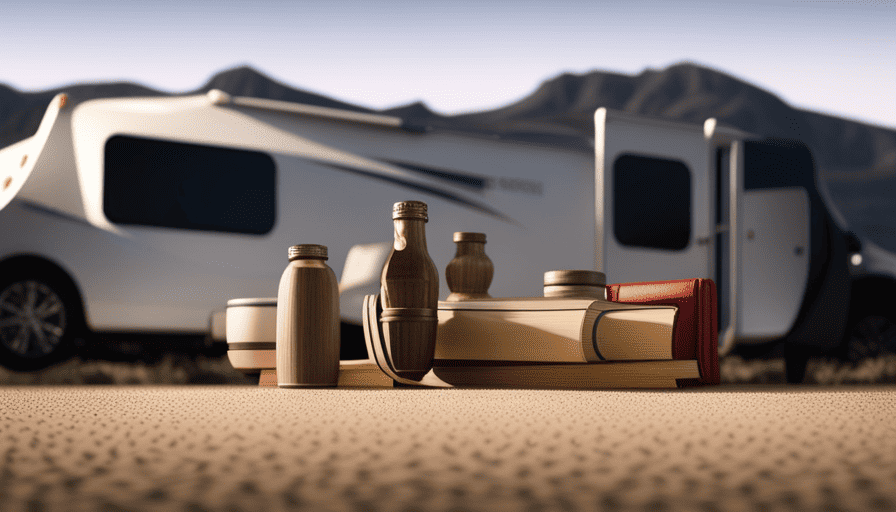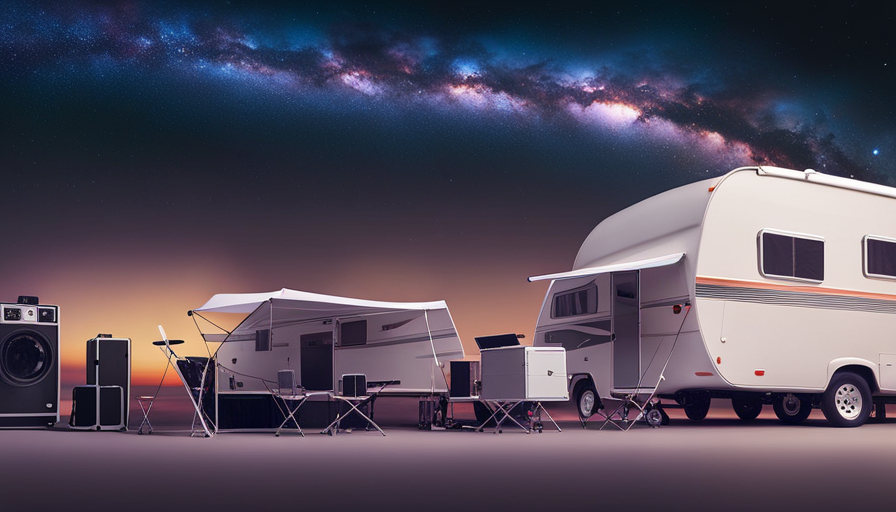Imagine embarking on a journey, with the endless road as your companion and breathtaking views at every corner. As you imagine yourself on this adventure, you might think: what is the average weight of a camper?
In this article, we will explore the various types of campers and delve into the factors that influence their weight. From lightweight backpacking tents to spacious motorhomes, we will uncover the average weights of different camper options.
Additionally, we will provide practical tips for reducing camper weight and considerations for towing and handling. Whether you are a seasoned camper or a novice explorer, understanding camper weight is crucial for a safe and enjoyable trip.
So, let’s dive in and discover the average weight of campers, empowering you to make informed decisions and embark on unforgettable adventures.
Key Takeaways
- The weight of campers can vary depending on the type, with travel trailers weighing between 1,500 to 8,000 pounds on average, fifth wheels weighing 10,000 to 15,000 pounds on average, and motorhomes weighing 10,000 to 30,000 pounds or more.
- Factors such as size, construction materials, furnishings and appliances, as well as water and fuel capacity, can all affect the weight of a camper.
- Lightweight materials such as aluminum and fiberglass are commonly used in campers to reduce weight.
- Proper weight distribution, towing capacity, and regular maintenance of the camper and towing system are crucial for safe and stable towing experience.
Different Types of Campers
When you’re exploring the world of camping, you’ll come across a variety of campers, each with its own unique features and characteristics.
One of the first things that might come to mind when considering a camper is its weight. Factors affecting camper weight include the type of camper and its construction materials.
There are several different types of campers, including travel trailers, fifth wheels, and motorhomes. Travel trailers tend to be lighter in weight compared to fifth wheels and motorhomes. They’re typically towed by a vehicle and can range in weight from around 1,500 to 8,000 pounds on average.
Fifth wheels are larger and more spacious, but they also tend to weigh more, with an average weight ranging from 10,000 to 15,000 pounds.
Motorhomes, which have their own engines, can weigh anywhere from 10,000 to 30,000 pounds or more.
It’s important to consider the weight of a camper when choosing one, as it can affect fuel efficiency and towing capacity. Factors such as construction materials and additional features can also impact the overall weight of a camper. These factors will be discussed further in the subsequent section about factors affecting camper weight.
Factors Affecting Camper Weight
When considering the factors that affect camper weight, there are several key points to take into account.
Firstly, the size and dimensions of a camper play a significant role in determining its overall weight. Larger campers tend to be heavier due to their increased size and the materials needed to construct them.
Additionally, the construction materials used in the camper’s build can greatly impact its weight. Campers made from lightweight materials such as aluminum or fiberglass will generally weigh less than those constructed with heavier materials like steel.
Finally, the furnishings and appliances inside the camper, as well as the water and fuel capacity, can also contribute to its overall weight. The more amenities and supplies a camper carries, the heavier it will be.
Size and Dimensions
To get a sense of the weight of an average camper, imagine it as a compact elephant in the room. When considering camper weight, size and dimensions play a crucial role.
Larger campers tend to weigh more due to the additional materials required for construction. However, it’s important to note that camper weight distribution is also a factor to consider. Some campers are designed to be lightweight, with materials and construction techniques that prioritize reducing weight without sacrificing durability. These lightweight camper options are ideal for those who want to minimize their towing load or have vehicles with lower towing capacities.
Moving on to the next section about construction materials, it’s essential to explore how the choice of materials affects the overall weight of a camper.
Construction Materials
The type of materials used in constructing a camper greatly impacts its overall weight and durability. Manufacturers use a variety of construction techniques and materials to build campers, each with its own pros and cons.
Traditional campers are often constructed with wood frames and aluminum siding, which provide good insulation and are relatively lightweight. However, these materials are susceptible to water damage and may require more maintenance.
On the other hand, newer campers may use fiberglass or composite panels, which are lightweight, durable, and resistant to water damage. These materials also have a lower environmental impact compared to traditional materials. By using innovative construction techniques and eco-friendly materials, camper manufacturers are able to reduce the overall weight while maintaining structural integrity.
Moving on to the next section about ‘furnishings and appliances’, the weight of these components also contributes to the overall weight of the camper.
Furnishings and Appliances
Outfitting a camper with stylish furnishings and modern appliances adds comfort and convenience to the ultimate road trip experience. When it comes to furniture selection, it’s important to choose pieces that are not only aesthetically pleasing but also functional and space-saving. Opting for multi-purpose furniture, such as a sofa bed or a dining table that can be folded away, can maximize the available space inside the camper.
Additionally, investing in energy-efficient appliances is crucial to ensure that the camper’s power supply is used efficiently. Look for appliances with high Energy Star ratings to minimize energy consumption and extend the battery life.
Now let’s move on to the next section about water and fuel capacity, where we will explore the essential considerations for a camper’s water and fuel needs.
Water and Fuel Capacity
When it comes to water and fuel capacity, you’ll want to ensure that your camper is equipped to meet your needs on the road. Here are a few key considerations to keep in mind:
-
Water Storage: It’s important to have enough water on board for drinking, cooking, and cleaning. Check the camper’s water tank capacity and consider if it’s sufficient for your trips or if you need additional water storage options.
-
Fuel Efficiency: Maximizing fuel efficiency is crucial for long journeys. Look for campers with efficient engines and aerodynamic designs to help reduce fuel consumption and save on costs.
-
Water Filtration: If you plan on camping in remote areas, a camper with a built-in water filtration system can be a great investment. It ensures that you have access to clean and safe drinking water wherever you go.
-
Waste Water Management: Don’t forget to consider waste water storage and disposal options. Look for campers with grey water tanks to store wastewater from sinks and showers, and black water tanks for toilet waste.
With these considerations in mind, you can choose a camper that meets your water storage and fuel efficiency needs. Speaking of needs, let’s move on to the next section about personal belongings and gear.
Personal Belongings and Gear
Make sure you pack all your personal belongings and gear before hitting the road in your camper! Personal organization is key to a successful camping trip. Here are some essential camping gear items to consider bringing along:
| Category | Item | Purpose |
|---|---|---|
| Sleeping | Sleeping bag | Provides warmth and comfort during the night |
| Cooking | Camp stove | Allows you to cook meals while enjoying the outdoors |
| Clothing | Rain jacket | Keeps you dry during unexpected rain showers |
| Lighting | Headlamp | Provides hands-free illumination in the dark |
| Hygiene | Portable toilet | Ensures you have a convenient and sanitary bathroom option |
By packing these essential items, you’ll be well-prepared for any camping adventure. Now, let’s move on to the next section about the average weight of lightweight backpacking tents.
Average Weight of Lightweight Backpacking Tents
To get started, you’ll be amazed at how lightweight backpacking tents can feel, like a feather floating on a summer breeze. When it comes to lightweight tent options for backpacking, there are a variety of choices available.
Ultralight camping gear has become increasingly popular among outdoor enthusiasts, and it’s no wonder why. These tents are specifically designed to be lightweight and compact, making them perfect for backpackers who value efficiency and ease of transportation.
When looking for a lightweight backpacking tent, it’s important to consider factors such as weight, durability, and ease of setup. Many lightweight tents weigh around 2 to 3 pounds, making them significantly lighter than traditional camping tents. This weight reduction can make a huge difference when you’re carrying your gear for long distances or over steep terrain.
Not only are lightweight backpacking tents easier to carry, but they also offer the same level of protection and comfort as heavier options. They’re typically made from high-quality materials that are both waterproof and durable. Despite their lightweight nature, these tents are designed to withstand the elements and keep you dry and comfortable throughout your camping trip.
Transitioning into the subsequent section about the average weight of pop-up campers, it’s important to note that while lightweight backpacking tents are designed for easy transportation, pop-up campers are a different story. These campers tend to be larger and heavier, requiring a towing vehicle for transportation.
Average Weight of Pop-Up Campers
If you’re a fan of spacious and comfortable camping experiences, you’ll be intrigued by the surprising weight of pop-up campers. These versatile campers are known for their ability to transform from a compact trailer into a spacious living area, providing campers with the best of both worlds. Pop-up campers are designed to be lightweight and easy to tow, making them a popular choice among campers who value convenience and mobility.
One of the key features of pop-up campers is their collapsible design, which allows for easy storage and transportation. When folded down, these campers have a low profile that minimizes wind resistance and improves fuel efficiency. This makes them an excellent choice for campers who enjoy exploring different locations and want to save on fuel costs.
In addition to their lightweight design, pop-up campers also offer a range of benefits. They typically come equipped with amenities such as sleeping quarters, a small kitchenette, and a dining area. Some models even include a bathroom and shower facilities. This means that campers can enjoy the comforts of home while still being able to experience the great outdoors.
Transitioning into the subsequent section about the average weight of travel trailers, it’s important to note that while pop-up campers are lightweight, travel trailers can be considerably heavier.
Average Weight of Travel Trailers
Get ready to be amazed by the surprising weight of travel trailers, because they offer a whole new level of comfort and convenience on your camping adventures! When it comes to travel trailers, weight distribution is key. These trailers are designed to distribute the weight evenly, ensuring a smooth and stable towing experience.
Here are four key points to consider:
-
Lightweight Construction: Travel trailers are built using lightweight materials such as aluminum and fiberglass, which significantly reduce their overall weight. This allows for easier towing and better fuel efficiency.
-
Compact Design: Despite their lightweight construction, travel trailers are designed to maximize space. With clever floor plans and smart storage solutions, you can bring all the essentials without compromising on comfort.
-
Towing Capacity: Before purchasing a travel trailer, it’s important to know the towing capacity of your vehicle. Travel trailers come in various sizes and weights, so make sure your vehicle can handle the load.
-
Lightweight Camping Gear: To further reduce the weight of your travel trailer, consider investing in lightweight camping gear. From foldable chairs and tables to compact cooking equipment, there are plenty of options available that won’t weigh you down.
As we move on to the next section about the average weight of fifth-wheel trailers, you’ll discover even more fascinating insights into the world of camper weights.
Average Weight of Fifth-Wheel Trailers
Fifth-wheel trailers, like majestic beasts gracefully roaming the open road, boast an impressive weight that can rival that of small homes. When it comes to fifth wheel trailer weight distribution, it is important to consider a few key factors.
The weight of these trailers is primarily determined by their size and the materials used in their construction. Larger fifth wheels tend to be heavier, as they offer more living space and amenities. Additionally, the type of materials used, such as aluminum or fiberglass, can also impact the weight.
Other factors that affect the weight include the number of slide-outs, which are extensions that increase the living area, and the presence of additional features like full-size appliances or luxurious furnishings. It is crucial to carefully consider these factors when choosing a fifth-wheel trailer to ensure that it can be safely towed by your vehicle.
With the knowledge of fifth-wheel trailer weight in mind, let’s now explore the average weight of motorhomes.
Average Weight of Motorhomes
Motorhomes, like majestic beasts roaming the open road, boast an impressive weight that can rival that of small homes. These recreational vehicles come in various sizes and models, but their weight is a crucial factor to consider when traveling. Understanding motorhome weight distribution and towing capacity is essential for a safe and comfortable journey.
Here are three key points to keep in mind:
-
Motorhome weight distribution: It’s crucial to distribute the weight properly inside the motorhome to maintain stability. Heavy items should be placed low and centered, while lighter items can be stored higher up. This ensures that the motorhome remains balanced, reducing the risk of accidents or swaying.
-
Towing capacity: Motorhomes are often used for towing additional vehicles or trailers. It’s important to know the motorhome’s towing capacity to avoid overloading it. Exceeding the towing capacity can lead to engine strain, reduced fuel efficiency, and potential damage to the motorhome.
-
Safety considerations: When it comes to motorhome weight, safety should always be the top priority. Regularly check the motorhome’s weight and make sure it falls within the manufacturer’s recommended limits. Additionally, ensure that the tires are properly inflated and that the brakes are in good working condition.
Understanding motorhome weight distribution and towing capacity is essential for a safe and enjoyable journey.
In the next section, we’ll explore some practical tips for reducing camper weight and optimizing your motorhome’s performance.
Tips for Reducing Camper Weight
When it comes to motorhomes, weight is a big concern. As we discussed earlier, the average weight of motorhomes can vary greatly depending on their size and features. But what if you’re looking to reduce the weight of your camper?
Well, there are a few tips and tricks that can help you achieve a lighter load. One of the best ways to reduce camper weight is by investing in lightweight camping gear. Nowadays, there are plenty of options available that are specifically designed to be lightweight without compromising on quality or functionality. From lightweight tents to compact cooking equipment, these gear options can significantly lighten your load.
Another tip is to be mindful of what you bring with you on your camping trips. Take only the essentials and avoid unnecessary items that will add unnecessary weight to your camper. It’s also a good idea to regularly declutter and get rid of any items that you no longer need.
By following these tips and being mindful of the weight of your camper, you can have a more enjoyable and stress-free camping experience. So now that we’ve discussed reducing camper weight, let’s move on to the next section about considerations for towing and handling.
Considerations for Towing and Handling
When considering towing and handling a camper, there are several key points to keep in mind.
First, it’s important to know your vehicle’s towing capacity to ensure it can safely handle the weight of the camper.
Second, using a proper hitching and sway control system can greatly improve stability while towing.
Lastly, proper weight distribution and braking systems are crucial for maintaining control and stopping safely.
By understanding and implementing these considerations, you can confidently tow your camper with peace of mind.
Vehicle Towing Capacity
You’ll need to know your vehicle’s towing capacity to determine the weight of the camper you can comfortably haul. Here are some important considerations when it comes to vehicle towing capacity:
-
Check your vehicle’s owner’s manual or consult with the manufacturer to find the maximum towing capacity.
-
Consider the weight of any additional passengers or cargo in the vehicle when calculating the weight of the camper you can tow.
-
Be mindful of the Gross Combined Weight Rating (GCWR) of your vehicle, which includes the weight of the vehicle, passengers, cargo, and the camper itself.
-
It’s crucial to understand proper vehicle towing techniques, such as using the appropriate hitch and ensuring proper weight distribution.
-
Always follow towing safety precautions, including using safety chains, checking tire pressure, and adjusting your driving habits to accommodate the added weight.
Understanding your vehicle’s towing capacity is essential for a safe and enjoyable camper hauling experience.
In the next section, we’ll explore hitching and sway control systems to enhance towing stability.
Hitching and Sway Control Systems
To enhance your towing stability and ensure a smooth and safe hauling experience, consider using hitching and sway control systems. These systems play a crucial role in preventing trailer sway and maintaining a steady ride.
When it comes to hitching safety, it’s important to choose a hitch that’s compatible with your vehicle’s towing capacity. Make sure to properly attach the hitch to both the vehicle and the camper, following manufacturer guidelines.
Additionally, weight distribution techniques can greatly improve towing stability. These techniques involve redistributing the weight of the load, typically using a weight distribution hitch, to ensure that the vehicle and camper are properly balanced.
By utilizing hitching and sway control systems, along with proper weight distribution, you can have peace of mind knowing that your towing experience will be safe and secure.
Now, let’s delve into the importance of proper weight distribution.
Proper Weight Distribution
Achieving proper weight distribution is like balancing a tray of drinks – if the weight isn’t evenly distributed, the tray becomes unstable and the drinks risk spilling.
When it comes to towing a camper, weight distribution is crucial. Here are three techniques to ensure proper weight distribution:
-
Use a weight distribution hitch: This device helps distribute the weight of the camper evenly across the tow vehicle and trailer, improving stability and control.
-
Adjust the tongue weight: The tongue weight, the downward force exerted by the trailer on the hitch, should typically be around 10-15% of the total trailer weight. Adjusting this weight ensures optimal handling and reduces the risk of sway.
-
Load the camper properly: Distribute the weight inside the camper evenly. Place heavier items towards the front and secure them to prevent shifting during travel.
Proper weight distribution is crucial for safe and smooth towing. Now, let’s move on to the next section about braking systems.
Braking Systems
Braking systems are essential for ensuring your safety and providing peace of mind while towing. Proper maintenance of your braking system is crucial to ensure it functions optimally.
Regularly check the brake pads and rotors for wear and tear, and replace them if necessary. Additionally, inspect the brake lines for any signs of leakage or damage.
When it comes to choosing the right brake controller, consider factors such as the weight of your camper and the type of towing vehicle you have. It’s important to select a brake controller that’s compatible with your vehicle’s braking system and can handle the weight of your camper.
By maintaining your braking system and choosing the right brake controller, you can have confidence in your ability to safely stop your camper when needed.
In the next section, we’ll discuss the conclusion and final thoughts on this topic.
Conclusion and Final Thoughts
In wrapping up, let’s take a moment to reflect on the average weight of campers. When it comes to hitting the road and embarking on a camping adventure, it’s important to consider the weight of your camper. Here are some key points to keep in mind:
-
Lighter is better: Packing efficiently is crucial to ensure a smooth camping experience. Try to prioritize lightweight essentials and avoid unnecessary items that can add unnecessary weight to your camper.
-
Avoid overpacking: It can be tempting to bring along everything you might possibly need, but overpacking can lead to an overweight camper. Be mindful of the weight limits and stick to the essentials.
-
Distribution matters: Properly distributing the weight within your camper is essential for safe and stable travel. Make sure to evenly distribute the weight to prevent swaying or tipping while on the road.
-
Regular maintenance: Keeping your camper in good condition is not only important for its longevity but also for its weight. Regularly inspect and maintain your camper to avoid any unnecessary weight gain due to wear and tear.
By following these tips and avoiding common mistakes, you can ensure that your camper remains at a manageable weight. Happy camping!
Frequently Asked Questions
Are there any specific weight limits for campgrounds or campsites?
Weight restrictions can vary for campgrounds or campsites. These limitations are put in place to ensure the safety and enjoyment of all campers. Exceeding weight limits can have a negative impact on the camping experience, as it can lead to damage to the grounds or infrastructure. Additionally, it can cause overcrowding and discomfort for other campers.
Therefore, it’s important to check with the specific campground or campsite for any weight restrictions before planning your trip.
How does the weight of camping gear and supplies impact the overall weight of a camper?
When it comes to camping gear and supplies, their weight plays a crucial role in the overall stability and distribution of weight in a camper. Think of it as balancing a delicate equation.
By carefully considering the weight of each item and ensuring proper distribution, you can enhance the stability of your camper. A well-balanced load minimizes the risk of swaying or tipping over, allowing for a safer and more enjoyable camping experience.
What are some common mistakes people make that lead to exceeding the weight limits of their camper?
Common mistakes that lead to exceeding weight limits in campers include overpacking unnecessary items, underestimating the weight of gear, and neglecting to distribute weight evenly.
Many people make the error of bringing too many items, such as multiple sets of dishes or excessive clothing.
Additionally, failing to accurately estimate the weight of gear, such as water tanks or propane tanks, can quickly add up.
Lastly, unevenly distributing weight can cause instability and potential damage to the camper.
Are there any legal requirements or regulations regarding camper weight?
There are legal requirements and regulations regarding camper weight. These guidelines vary depending on the country or state you’re in. It’s essential to adhere to these regulations to ensure safety on the road. Exceeding the weight limits can lead to accidents, damage to the camper, and legal consequences. Always consult your local transportation authority or camper manufacturer for specific weight limits and regulations to avoid any issues while traveling.
How does the weight of a camper impact fuel efficiency and towing capabilities?
The weight of a camper has a significant impact on both fuel efficiency and towing capabilities. For every 100 pounds of extra weight, fuel efficiency decreases by about 1-2%. This means that a heavier camper will require more fuel to travel the same distance.
Additionally, weight distribution is crucial for safe towing. Improper weight distribution can lead to poor handling and increased risk of accidents. Therefore, it’s important to consider both the overall weight and the distribution of weight when towing a camper.
Is the Weight of a Small Camper Similar to the Average Camper?
When comparing small camper weight to that of an average camper, there are notable differences. Small campers generally weigh significantly less than their larger counterparts, making them easier to tow and maneuver. However, the weight can vary depending on the specific model and features. It is crucial to consider the weight limitations of your vehicle and ensure proper weight distribution for safe and enjoyable camping adventures.
Conclusion
In conclusion, after conducting thorough research and analysis, it’s clear that the weight of campers varies significantly depending on the type and model. Lightweight backpacking tents have an average weight of around 2 to 4 pounds. Pop-up campers range from 1,000 to 3,000 pounds. Travel trailers can weigh anywhere from 2,000 to 8,000 pounds, and motorhomes can go up to 30,000 pounds.
It’s essential to consider these weight factors when choosing a camper and to take steps to reduce weight wherever possible. By understanding towing and handling considerations, you can ensure a safer and more enjoyable camping experience.



















